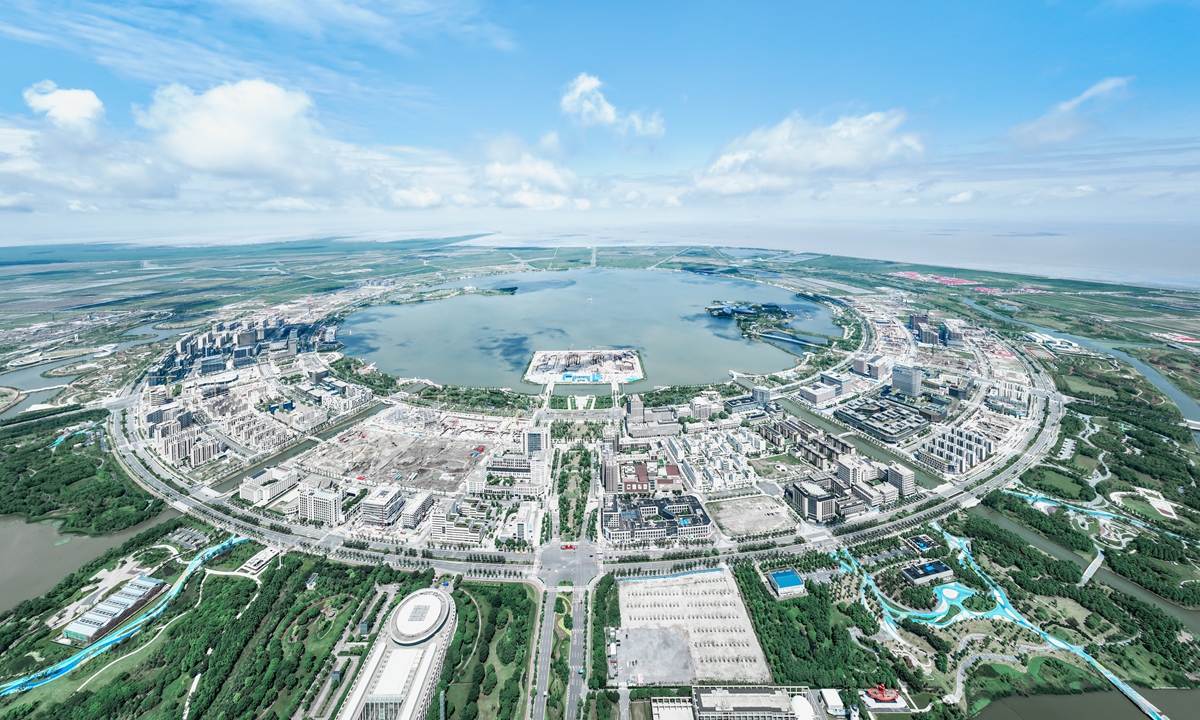West can learn from China about selection of elites and officials’ accountability: French entrepreneur

Lingang New Area of Shanghai Free Trade Zone Photo: VCG
Editor's Note:For Chinese people, the past decade has been epic and inspirational. The country, under the leadership of the Communist Party of China (CPC) Central Committee with Comrade Xi Jinping at the core, has made great endeavors in boosting its economy, deepening reforms, improving the rights of its people and acting as a responsible global power.
What aspects in China are attractive to foreign entrepreneurs? What's the difference between the so-called freedom in Western media reports and that from expats' actual experience in China? Arnaud Bertrand (Bertrand), an entrepreneur who founded Europe's largest holiday apartments platform HouseTrip and Me & Qi, a website that explains Traditional Chinese Medicine, shared his views with Global Times (GT) reporter Li Aixin.
This is the 20th article of the Global Times series about this special decade.
GT: After you came to China eight years ago, which aspects of China's development left you the most impression? Why?
Bertrand: In my personal life, the most impressive aspect of China was definitely the efficiency. I don't think many Chinese people realize just how fast things get done in China compared with the rest of the world. It's often just small things like getting a plumber to fix a leak in your apartment or taking a blood test at the hospital. When in France - where I am from - it would take literally days or weeks to organize this, in China it's almost instant: you can get a plumber at your door in less than half an hour or get a blood test by simply going to the hospital and asking for one. It might all seem anecdotal but this all adds up and makes life in China incredibly efficient.
I was also very impressed by China's capability to remain highly flexible despite its scale. One always assumes that as bureaucracies and organizations gain in scale they become paralyzed by processes and hierarchies that make them inflexible and slow. In China it's often almost the contrary: large organizations can move at lightning speed and be incredibly flexible. I think it has a lot to do with how people are empowered. In France when you deal with large organizations or administrations there is little flexibility because people just have to apply the rules, they aren't empowered to adapt them to your particular case. Oftentimes, only a small committee at the top of the organization can make exceptions. But in China my experience is that there is often a large degree of flexibility: you can reason with people so that pragmatism and logic win the day. This is probably by design because if that wasn't the case, given China's scale and complexity, everything would just grind to a halt.
GT: What conditions in China are more attractive to entrepreneurs like you? And how do you view China's innovation capabilities?
Bertrand: I've actually never created a company targeting the Chinese market, but over my many years in China I've met many entrepreneurs. What's most attractive is of course the size of the market: if you make it big in China, you make it bigger than just about anywhere else on earth.
What's also very attractive is the strength and diversity of China's supply chains. For anything you might dream of building, you can find an incredible array of suppliers. This makes building something in China vastly easier and faster than anywhere else.
On the other side of the coin, and in my experience, this is a miscalculation many foreign entrepreneurs make when they come to China, not realizing that China is incredibly competitive. For any industry and concept, you have hundreds of other companies staffed with extremely competent people competing with you. So, it's a real test for entrepreneurs: if you can succeed in China, you can fairly assume you can succeed anywhere else! And that's also the reason why so many Western companies succeed everywhere else but not in China: in the field of entrepreneurship, it's the Premier League!

Arnaud Bertrand Photo: Courtesy of Bertrand
GT: In 2021, a report of shine.cn quoted you as saying, "For me, China offers a considerable amount of freedom if one has the right definition for it." Would you elaborate on the view? In terms of the "freedom in China," would you like to share what's the difference between that in Western media reports and that from your experience in China?Bertrand: We have come to have a very specific - and somewhat skewed - definition of freedom in the West. What we mean by freedom is in fact individual freedom, the concept that we're all born with inalienable rights as individuals and that one of the primary responsibilities of the state or the collectivity is to ensure that those rights aren't violated, which is an important concept but, left unbalanced, leads to some very obvious downsides for society as a whole. A great example is of course the right to bear arms in the US. Or property rights: within a few generations, individual property rights applied strictly lead to an extreme concentration of wealth in just a few hands and a very unequal society.
Or even freedom of expression, which as an individual is extremely liberating - everyone obviously wants to express themselves freely - but, as we can see in many Western societies, when left unchecked it leads to a situation where there are so many conflictual interpretations of reality that societies become incredibly divided, with different groups living in alternate realities. What we call "post-truth" societies, where there is simply no common understanding of the world, and widespread distrust in the government and media. Which is a big problem because trust is the glue that binds a society together.
So we arrive at the somewhat paradoxical situation where unchecked individual freedom effectively erodes freedom in society overall. The best illustration of this paradox is the fact that the US, the country that probably has the strongest individual freedoms in the world, is also by far the country with the highest prison population in the world: they have almost 25 percent of the world's prisoners despite having only 4 percent of the world's population. A very good case can be made that this is a direct result of individual freedom left unchecked: the freedom to bear arms, the drug problem (which arguably is a result of too much freedom given to youngsters to experiment with those substances), the structural poverty and inequality that result from an extreme interpretation of individual property rights, etc.
How free are you really in a country like this, plagued by extreme inequality, high crime rates, mass imprisonment, high social tensions and very little trust in the government, the media and your fellow citizens? Is this really "freedom?"
Living in China has made me realize that individual rights have to be balanced by other forces that ensure that the common good serves as a guide. Freedom means little in a society plagued by many ills. Individual rights have to be balanced with a responsibility we all have to ensure our collective environment is healthy and sustainable. At the end of the day, we always come back to the Chinese concept of Yin and Yang: Everything is always about balance and harmony, nothing ever should take an overriding importance over its opposite, otherwise the system as a whole becomes destabilized.
GT: In your opinion, what's the biggest difference between the CPC governance and the US elite politics? Why have the US media and politicians kept smearing China's political system and attacking the Chinese government as an "authoritarian government" that lacks "democracy?"
Bertrand: I often say that if I were living in the US I would be a libertarian, an advocate of a small and weak government restrained to performing as few functions as possible, whereas in China I'm quite content with a very strong state. Why? Because it all depends on how the state's actions are aligned with the common good. If it is a constructive force that drives society in a better direction - like reducing poverty, improving living standards, building infrastructure or converting society to use green energy like China has been doing - a strong state is highly preferable because the state remains the institution most capable of driving such changes. But if a state becomes a destructive force, when for instance it becomes an effective plutocracy that starts acting only in the interests of a privileged few or if it becomes overtaken by the military-industrial complex, then you obviously want such a state to have as little power as possible.
It is worth reminding this incredible statistic: According to research made by two professors from Tufts University and Bridgewater State University, since the end of the Cold War the US has waged an incredible 100 military interventions abroad! The comparison with China is stunning: during the same period China's military hasn't as much as fired a single bullet or missile on anyone abroad! It's something China can rightly feel immensely proud about. War and killing people, especially innocent civilians abroad, remains the most detestable act a government can do.
GT: In terms of governance, do you think there may be something in China that is worthy of learning from by the US and other Western countries?
Bertrand: I think there are two obvious learnings that, if they were applied by Western countries (or any country), would drive tremendous benefits.
The first one is about selection of elites and accountability. China is probably the country in the world that has experimented the most with building a meritocracy for the selection of its leaders. Today in order to become a senior official, say the governor of a province, you need to go through an incredibly competitive selection system which results in a lot of competence at the top. In addition, there is now little tolerance for corruption in any form and those found guilty face accountability that has no equivalent in the West.
The second one is about the position of the state. Many people in the West believe that China is now a capitalist country. This is not the case, it's a socialist country that uses market forces as a tool to help drive its development. It's not capitalist because the state still sits well above capital, instead of being driven by it. Actual representatives of the people are in charge of determining the direction of society. For instance, it is unthinkable in China that billionaires or tech titans would finance political life or have lobbies that directly shape legislation. You want those who accumulated a lot of wealth to feel that it means they also have a higher degree of responsibility and that there is a strong state above them guaranteeing this. You also want the people in general to know that no matter how rich and powerful you are, there are no special favors.
GT: You recently tweeted that when European delegations head to Taiwan island and make statements on it, they don't realize they are damaging their image in Asia, they're seen as provocateurs. Why do some Western politicians tend to have a self-deceiving mentality, ignoring the real attitude of other regions? How do Western voters view those politicians, who sacrifice their countries' long-term stable relations with China for the sake of personal interests?
Bertrand: This is very deep rooted. It was the crusades, it was colonialism, it was the so-called "white savior" mentality: We have a deeply proselyte nature, we believe our values and ideas are so much better than others that they are universal and should be applied everywhere. The people in the West have these ideas deeply ingrained in them and Western rulers cynically use concepts like "spreading/defending our values" to sell what are in fact much more cunning geopolitical moves.
This is the same with Taiwan island. It's sold to the European public as "defending our values" but the real purpose is to defend the US-led world order and keep China's military contained behind the so-called first island chain. The repeated provocations - like Pelosi's visit or Lithuania's opening of an effective "Taiwan embassy" - might also be about triggering a war in the Taiwan Straits and thereby have a casus belli that justifies taking extreme measures against China.
I'm sad to report that there is very strong support among Europeans for such a position against China. A relentless flow of anti-China propaganda in European media has done incredible damage. In France for instance there is virtually no media with significant viewership that I can go to if I want to read sensible analysis of what's happening geopolitically when it comes to China. Incredibly, it is even worse than in the US or Australia where some large media still have some somewhat accurate pieces and where you have prominent activists against a new Cold War or against US imperialism.
You also have large think tanks like the Quincy Institute for Responsible Statecraft that promote a restrained foreign policy. No equivalent in France: the media's "China experts" are the equivalent of the most hawkish voices in the US, presenting China as an evil force that needs to be at best contained, at worst defeated. There is little nuance and a near total absence of realism. In such a media environment, you can't blame the French people for their views on China.


